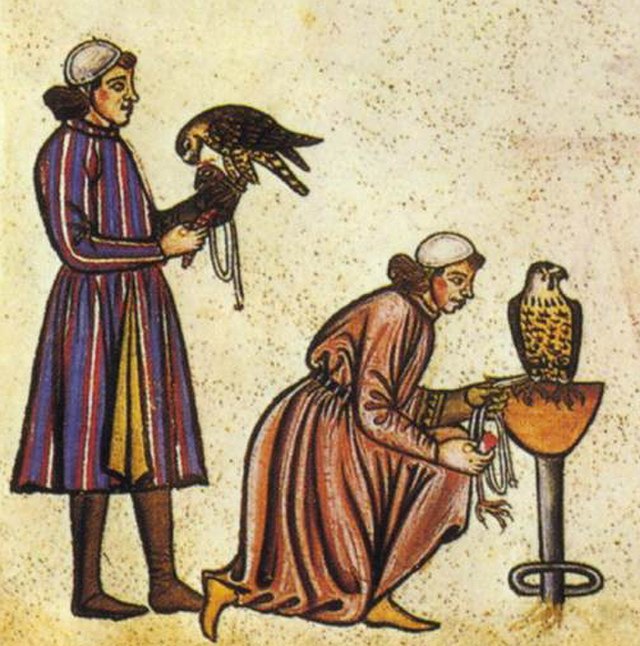Falconer
Being a falconer that trains Carrier Falcons is a very prestigious position and, at the same time, a vital role to fulfil in the Dercian society as they are providing one of the few non-magical means of transporting a message that is almost free of intercepting, either by nature or by the enemy, one of the reasons the Dercian military switched from carrier pigeons to the falcons.
Practice at Intervals
Once a pair of carrier falcons have bonded and formed a couple, the training to carry a message can begin. The first part of the training consists of taking one of the falcons out of the base location and then carrying them a set distance away. Most falconers set the first training distance as around one kilometre, whereafter the falcon is released, the falcon will then fly back to the base location; this is repeated for up to a month or two for each bird. After this, the distance is increased until the distance is 100 kilometres. Increasing the range lets the falcons build up endurance and increase the birds' confidence.Food and Water Incentives
A way falconers use to train the carrier falcons to fly from one location to another is that the falconers remove the food from the base location and then manually carriers the bird to the other site where food is set up; the falcon will then feed at the second location before returning to the base location, this way if the person wishing to send a message to the other site will have to remove the food from the base location the day they want to send the message. This method only works if it's a permanent route the falcon will have to fly.Attaching the Message
A message is normally carried in small backpacks made of fabric. Sometimes small tubes made out of leather are also used and tied to the bird's legs.Career
Qualifications
New falconers begin their training as the apprentice under a master falconer. To come under consideration for an apprenticeship, one must first show that one processes a certain amount of knowledge of the birds.
Some falconers also value that new apprentices have a good relationship with the birds, making it easier for them to train with the birds.
Unlike other prestigious professions, becoming a falconer can be achieved at all levels in society, and it's also not a profession one can bribe their way to the title of Master falconer.
There are generally three levels of training to become a falconer.
Apprentice: spends most of their time looking after the birds, cleaning and giving food while observing the master falconer during training. Some master falconers allow apprentices to handle the birds, but only if a bird has taken a liking to the apprentice.
General falconer: is allowed to train the falcons and is generally expected to be able to handle the falcons alone, an apprentice typically reaches this level after five years, but many stay longer.
Master falconers, having reached this level, must prove to have raised at least two pairs of carrier falcons successfully. Having reached this level, the new falconer will typically search for employment under another master falconer for another 5-10 years to learn more but is viewed as fully trained by most.
Career Progression
A typical apprenticeship lasts 5-10 years, after which the person will serve under another falconer for another 5-10 years.
Payment & Reimbursement
A master falconer can provide up to 5 falcon pairs each year, as training of the birds usually takes 2-3 years.
A common carrier falcon pair for use in the army can cost up to 1500 Crown were the rare colour variants, and those intended for royal use can cost up to 5000 Crown
Perception
Purpose
A falconer's purpose is to train Carrier Falcons to carry messages for the Dercian military and the royal family.
Social Status
Being a falconer is a very sought-after profession due to the social status it provides the falconer. A high-quality falconer can gain contacts within the royal family.
Demographics
In the whole Empire of Dercia there are around 100 falconers.
History
In the beginning, many people who trained carrier pigeons were sceptical towards this new idea of using falcons to carry messages. Still, as the concept proved its usage, some were convinced and began to catch wild falcons they would then bread in captivity. In the profession's early years, several people trained falcons, but over time, the increased cost compared to pigeons caused most of these to either go bankrupt or go back to pigeons.
After some decades, the number of falconers able to raise, breed, and train high-quality falcons that the Dercian military was interested in settled around 100 giving the profession a huge prestige boost.
Operations
Tools
The standard equipment for a falconer used in the process of raising, breeding, and training consists of the following:
Thick gloves against the claws and beak.
Leashes used during early training when falconer and bird are getting to know each other, allow the bird to be attached to its perch but can fly up to 45 meters away.
Workplace
Falconers will typically have their home and training facilities away from major urban centres so as not to stress the birds or risk them being injured by common people.
Dangers & Hazards
A falconer is always at risk of the bird attacking and injuring the falconer during training, but in most cases, these attacks only result in light cuts due to the equipment used.



Comments